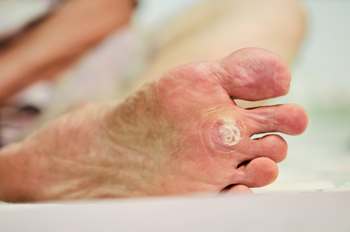
Plantar warts appear on the soles of the feet and are caused by a viral infection in the outer skin layer. They often develop in areas of pressure, such as the heel or ball of the foot, and may feel like stepping on a small stone. These warts can spread through skin contact or from walking barefoot on damp surfaces like gym floors or locker rooms. While some may go away on their own, others can grow, multiply, or cause discomfort with walking. Avoid picking at the area to prevent spreading the virus, and keep the foot clean and dry. For persistent or painful warts, or, if walking becomes difficult, seeing a podiatrist can help avoid further issues. If a plantar wart is not improving with home care, it is suggested that you consult a podiatrist for a proper evaluation and appropriate care.
Plantar warts can be very uncomfortable. If you need your feet checked, contact one of our podiatrists from Lakewood Family Foot and Ankle. Our doctors will assist you with all of your foot and ankle needs.
About Plantar Warts
Plantar warts are the result of HPV, or human papillomavirus, getting into open wounds on the feet. They are mostly found on the heels or balls of the feet.
While plantar warts are generally harmless, those experiencing excessive pain or those suffering from diabetes or a compromised immune system require immediate medical care. Plantar warts are easily diagnosed, usually through scraping off a bit of rough skin or by getting a biopsy.
Symptoms
- Lesions on the bottom of your feet, usually rough and grainy
- Hard or thick callused spots
- Wart seeds, which are small clotted blood vessels that look like little black spots
- Pain, discomfort, or tenderness of your feet when walking or standing
Treatment
- Freezing
- Electric tool removal
- Laser Treatment
- Topical Creams (prescription only)
- Over-the-counter medications
To help prevent developing plantar warts, avoid walking barefoot over abrasive surfaces that can cause cuts or wounds for HPV to get into. Avoiding direct contact with other warts, as well as not picking or rubbing existing warts, can help prevent the further spread of plantar warts. However, if you think you have developed plantar warts, speak to your podiatrist. He or she can diagnose the warts on your feet and recommend the appropriate treatment options.
If you have any questions, please feel free to contact our office located in Lakewood, CA . We offer the newest diagnostic and treatment technologies for all your foot care needs.
